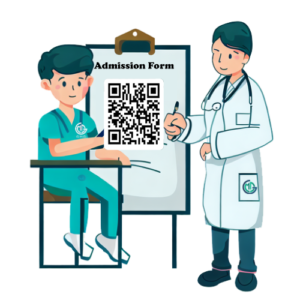Scribing Program
At GMD Medicare Solution Pvt Ltd, we offer a comprehensive medical scribing program designed to help healthcare professionals work more efficiently and effectively. Our program trains medical scribes to accurately document patient encounters in real-time, enabling physicians to focus on delivering the best possible care. Our scribes undergo extensive training in medical terminology, anatomy, and physiology. They are also well-versed in HIPAA compliance and possess a deep understanding of the healthcare industry.
We provide rigorous training and ongoing support to ensure that our remote medical scribes are well-prepared to handle any challenges they may face in the field while maintaining the highest level of service for our clients. Contact us today to learn more about our remote medical scribing program and how we can help streamline your healthcare practice.
How is the training process?
At GMD, our training program typically includes a combination of theoretical and practical training to provide candidates with comprehensive knowledge and hands-on experience in medical documentation. Here are some of the key components that may be included in a medical scribing training program:
-
Medical Terminology: Candidates will be trained in medical terminology to help them understand medical language used by healthcare providers.
-
Anatomy and Physiology: Candidates will learn about the human body's structure and functions to help them understand medical procedures and terminology better.
-
Clinical Documentation: Candidates will be trained in different types of medical documentation, including progress notes, medical history, and physical examination findings.
-
Charting: Candidates will learn how to create and update patient records accurately and efficiently using electronic health record (EHR) systems.
-
Privacy and Confidentiality: Candidates will learn about patient privacy laws, such as HIPAA, to ensure that patient information remains confidential.
-
Communication Skills: Effective communication with healthcare providers is a vital aspect of medical scribing. Candidates will be trained in communication skills, including active listening, summarizing, and asking relevant questions.
-
On-the-job Training: Candidates will have opportunities to observe and participate in patient encounters, working alongside experienced medical scribes or healthcare providers.
The training program may be offered in a classroom-based format, online, or a combination of both. The training duration may vary depending on the healthcare organization and the specific needs of the healthcare providers.
What does a scribe do?
A remote medical scribe performs the same tasks as an on-site medical scribe but works from a remote location. The primary role of a remote medical scribe is to document patient encounters in real-time, allowing physicians to focus on delivering high-quality patient care.
Remote medical scribes undergo extensive training in medical terminology, anatomy, and physiology, as well as HIPAA compliance. They utilize advanced technology to connect with physicians and other healthcare providers in real-time, ensuring accurate and efficient documentation of patient encounters.
Remote medical scribes work with physicians in various settings, including hospitals, clinics, and private practices. They document patient encounters across different specialties, such as radiology, cardiology, and internal medicine and more.
By collaborating with remote medical scribes, physicians can work efficiently and effectively regardless of their location. Remote medical scribes ensure that patient documentation is accurate and up-to-date, reducing the risk of errors and enhancing the overall quality of patient care.
Qualifications
To qualify as a medical scribe, candidates should have:
 A high school diploma or equivalent, along with a strong understanding of medical terminology, anatomy, and physiology.
A high school diploma or equivalent, along with a strong understanding of medical terminology, anatomy, and physiology.- Excellent typing skills with a focus on speed and accuracy, coupled with exceptional communication skills.
- The ability to maintain confidentiality and patient privacy in compliance with HIPAA regulations.
- The capability to work collaboratively with healthcare providers in a fast-paced, high-pressure environment.
Overall, candidates for a medical scribe position should possess a strong interest in pursuing a career in the healthcare industry. They should also be committed to delivering high-quality patient care by providing accurate and efficient documentation services to healthcare providers.
Please fill the admission form if you are interested in being a scribe.
We currently have no job openings